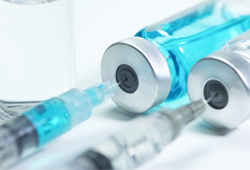 In response to the COVID-19 pandemic, the U.S. and many state governments have taken a number of steps to expand access to telehealth services and reduce other barriers to care. Among other things, the U.S. Centers for Medicare and Medicaid Services (CMS) has eliminated a number of restrictions on the coverage of telehealth services under Medicare to enable coverage of services provided to patients, including new patients, located in their homes. Many commercial payors have also taken action to expand access to telehealth, including by eliminating co-payments for such services. Many states have temporarily waived in-state licensure requirements to enable physicians, registered nurses, licensed practical nurses, nurse practitioners, and other medical personnel licensed in any state to provide telehealth services to their residents. The Department of Health and Human Services (HHS), Office of Inspector General (OIG) announced that physicians and other practitioners will not be subject to administrative sanctions for reducing or waiving any cost-sharing obligations Federal health care program beneficiaries may owe for telehealth services. The HHS Office for Civil Rights (OCR) additionally announced that during the pandemic, it will allow healthcare providers to provide telehealth services to patients through any non-public facing communication applications such as Apple FaceTime, Facebook Messenger, Google Hangout, and Skype. Finally, the Drug Enforcement Administration (DEA) and the Food and Drug Administration (FDA) have both taken steps in response to the COVID-19 pandemic to remove barriers restricting patient access to controlled substances and medicines. We review these developments below.
In response to the COVID-19 pandemic, the U.S. and many state governments have taken a number of steps to expand access to telehealth services and reduce other barriers to care. Among other things, the U.S. Centers for Medicare and Medicaid Services (CMS) has eliminated a number of restrictions on the coverage of telehealth services under Medicare to enable coverage of services provided to patients, including new patients, located in their homes. Many commercial payors have also taken action to expand access to telehealth, including by eliminating co-payments for such services. Many states have temporarily waived in-state licensure requirements to enable physicians, registered nurses, licensed practical nurses, nurse practitioners, and other medical personnel licensed in any state to provide telehealth services to their residents. The Department of Health and Human Services (HHS), Office of Inspector General (OIG) announced that physicians and other practitioners will not be subject to administrative sanctions for reducing or waiving any cost-sharing obligations Federal health care program beneficiaries may owe for telehealth services. The HHS Office for Civil Rights (OCR) additionally announced that during the pandemic, it will allow healthcare providers to provide telehealth services to patients through any non-public facing communication applications such as Apple FaceTime, Facebook Messenger, Google Hangout, and Skype. Finally, the Drug Enforcement Administration (DEA) and the Food and Drug Administration (FDA) have both taken steps in response to the COVID-19 pandemic to remove barriers restricting patient access to controlled substances and medicines. We review these developments below.
Read the Alert >>
 As part of the U.S. government’s response to the COVID-19 pandemic, on March 10, 2020, the Secretary of Health and Human Services (“Secretary”) issued a Declaration pursuant to the Public Readiness and Emergency Preparedness Act (“PREP Act”), 42 U.S.C. § 247d-6d. This Declaration activated immunity from personal injury, property damage, and other types of claims for companies and certain professionals who manufacture, distribute, or use “covered countermeasures”— certain drugs and devices, or components thereof, that may be used to treat COVID-19 patients or combat the COVID-19 pandemic.[1] The PREP Act provides broad immunity from liability, but applies only to products and persons that qualify for the immunity under the PREP Act and the limits established in the Secretary’s Declaration.
As part of the U.S. government’s response to the COVID-19 pandemic, on March 10, 2020, the Secretary of Health and Human Services (“Secretary”) issued a Declaration pursuant to the Public Readiness and Emergency Preparedness Act (“PREP Act”), 42 U.S.C. § 247d-6d. This Declaration activated immunity from personal injury, property damage, and other types of claims for companies and certain professionals who manufacture, distribute, or use “covered countermeasures”— certain drugs and devices, or components thereof, that may be used to treat COVID-19 patients or combat the COVID-19 pandemic.[1] The PREP Act provides broad immunity from liability, but applies only to products and persons that qualify for the immunity under the PREP Act and the limits established in the Secretary’s Declaration. As discussed in Goodwin’s prior Client Alert, on April 10, 2020, the U.S. Department of Health and Human Services (HHS) began disbursing $30 billion to Medicare providers and suppliers under the Public Health and Social Services Emergency Fund (PHSS Emergency Fund). HHS is requiring providers to agree to certain terms and conditions or return the payments. A number of the terms and conditions created some confusion as to whether providers who have not provided services directly related to COVID-19 may keep the payments. HHS has now clarified that providers may keep payments distributed under the PHSS Emergency Fund regardless of whether they have or will provide services directly related to COVID-19.
As discussed in Goodwin’s prior Client Alert, on April 10, 2020, the U.S. Department of Health and Human Services (HHS) began disbursing $30 billion to Medicare providers and suppliers under the Public Health and Social Services Emergency Fund (PHSS Emergency Fund). HHS is requiring providers to agree to certain terms and conditions or return the payments. A number of the terms and conditions created some confusion as to whether providers who have not provided services directly related to COVID-19 may keep the payments. HHS has now clarified that providers may keep payments distributed under the PHSS Emergency Fund regardless of whether they have or will provide services directly related to COVID-19. On Friday, April 10, 2020, the U.S. Department of Health and Human Services (HHS) announced it will begin disbursing $30 billion of the $100 billion of the Public Health and Social Services Emergency Fund recently allocated by the Coronavirus Aid, Relief, and Economics Security Act (CARES Act), signed March 27, 2020. Inclusive of the $30 billion, the $100 billion funding will be used to reimburse healthcare providers and facilities.
On Friday, April 10, 2020, the U.S. Department of Health and Human Services (HHS) announced it will begin disbursing $30 billion of the $100 billion of the Public Health and Social Services Emergency Fund recently allocated by the Coronavirus Aid, Relief, and Economics Security Act (CARES Act), signed March 27, 2020. Inclusive of the $30 billion, the $100 billion funding will be used to reimburse healthcare providers and facilities. Subtitle F of the recently enacted U.S. CARES Act substantially reforms the regulatory framework for non-prescription drugs, representing the most significant update of the review process for over-the-counter (OTC) drugs since that process was first established in 1972. The Act draws from recent legislative proposals to reform OTC regulation, incorporating a modified version of the “Over-the-Counter Monograph Safety, Innovation, and Reform Act of 2019” (S. 2740, H.R. 3443) that was passed 91-2 by the U.S. Senate in December 2019. At that time, Senate Health Committee Chairman Lamar Alexander (R-Tenn.) described the legislation as “the most important new law affecting the safety, innovation, and affordability of over-the-counter drugs since the 1970s.”
Subtitle F of the recently enacted U.S. CARES Act substantially reforms the regulatory framework for non-prescription drugs, representing the most significant update of the review process for over-the-counter (OTC) drugs since that process was first established in 1972. The Act draws from recent legislative proposals to reform OTC regulation, incorporating a modified version of the “Over-the-Counter Monograph Safety, Innovation, and Reform Act of 2019” (S. 2740, H.R. 3443) that was passed 91-2 by the U.S. Senate in December 2019. At that time, Senate Health Committee Chairman Lamar Alexander (R-Tenn.) described the legislation as “the most important new law affecting the safety, innovation, and affordability of over-the-counter drugs since the 1970s.” The Coronavirus Aid, Relief, and Economic Security Act (“CARES Act”), which was enacted on March 27, 2020, created new programs and expanded existing programs in ways that significantly affect the options for employers. This alert identifies key aspects of the CARES Act that can affect employers’ decisions in managing payroll costs during this challenging period. This alert also reviews other considerations for employers, including federal and state plant closing laws and Fair Labor Standards Act (“FLSA”) requirements. This alert focuses on considerations based on federal law and the laws of California, Massachusetts and New York.
The Coronavirus Aid, Relief, and Economic Security Act (“CARES Act”), which was enacted on March 27, 2020, created new programs and expanded existing programs in ways that significantly affect the options for employers. This alert identifies key aspects of the CARES Act that can affect employers’ decisions in managing payroll costs during this challenging period. This alert also reviews other considerations for employers, including federal and state plant closing laws and Fair Labor Standards Act (“FLSA”) requirements. This alert focuses on considerations based on federal law and the laws of California, Massachusetts and New York.